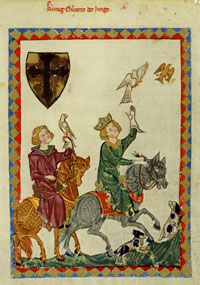 (left)
was born in Wolfstein, Bavaria, to Conrad IV of Germany and Elisabeth of Wittelsbach.
Having lost his father in 1254 he grew up at the German court under the tutelage of his uncle,
Louis II, Duke of Upper Bavaria, who held Swabia for him. He planned to assume his father’s throne
in Sicily, but his half-brother Manfred used a false rumor of Conradin’s death to seize the throne
in 1258. Despite attempts to make peace with the papacy, he was relentlessly persecuted by Rome,
including an edict forbidding his election as king of the Romans. Little is known of his appearance
and character except that he was "beautiful as Absalom, and spoke good Latin". Conradin took possession
of the duchy of Swabia in 1262, and remained for some time in his dukedom.
(left)
was born in Wolfstein, Bavaria, to Conrad IV of Germany and Elisabeth of Wittelsbach.
Having lost his father in 1254 he grew up at the German court under the tutelage of his uncle,
Louis II, Duke of Upper Bavaria, who held Swabia for him. He planned to assume his father’s throne
in Sicily, but his half-brother Manfred used a false rumor of Conradin’s death to seize the throne
in 1258. Despite attempts to make peace with the papacy, he was relentlessly persecuted by Rome,
including an edict forbidding his election as king of the Romans. Little is known of his appearance
and character except that he was "beautiful as Absalom, and spoke good Latin". Conradin took possession
of the duchy of Swabia in 1262, and remained for some time in his dukedom.
Not much happened until 1266 when Charles of Anjou defeated and killed Manfred at Benevento.
Alarmed by Charles of Anjou’s activities,  envoys from the Ghibelline cities came then to Bavaria and urged Conradin to come and free Italy.
Pledging his lands, he crossed the Alps and issued a manifesto at Verona setting forth his claim on Sicily.
Proclaiming him King of Sicily, his supporters, both in the northern and southern Italy, took up arms and
the young king himself received welcomes at Pavia, Pisa and Siena. In September 1267 a Spanish fleet
disembarked in the Sicilian city of Sciacca, and most of the island rebelled against the Angevine rule.
Only Palermo and Messina remained loyal to Charles. The revolt soon spread through Calabria. Despite being
excommunicated in November 1267, his fleet won a victory over that of Charles. In July 1268, Conradin
himself entered with immense enthusiasm in Rome.
Included in this revolt were most of the nobility who had survived the
Battle of Benevento and whom Charles had spared, including the important Lancia
family.
envoys from the Ghibelline cities came then to Bavaria and urged Conradin to come and free Italy.
Pledging his lands, he crossed the Alps and issued a manifesto at Verona setting forth his claim on Sicily.
Proclaiming him King of Sicily, his supporters, both in the northern and southern Italy, took up arms and
the young king himself received welcomes at Pavia, Pisa and Siena. In September 1267 a Spanish fleet
disembarked in the Sicilian city of Sciacca, and most of the island rebelled against the Angevine rule.
Only Palermo and Messina remained loyal to Charles. The revolt soon spread through Calabria. Despite being
excommunicated in November 1267, his fleet won a victory over that of Charles. In July 1268, Conradin
himself entered with immense enthusiasm in Rome.
Included in this revolt were most of the nobility who had survived the
Battle of Benevento and whom Charles had spared, including the important Lancia
family.
Unfortunately, Conradin was too young and too poorly equipped to deal with someone of the stature and experience of Charles of Anjou. Despite seeming enthusiasm, Conradin had serious problems, even if he did not recognize them, not the least of which was a critical shortage of money. Moreover, his uncle Louis and other companions had defected and returned to Germany, depriving him of much needed leadership. This, coupled with Conradin’s inexperience, would prove fatal in the coming battle.
On August 23, 1268 at Tagliacozzo the fight initially went Conradin's way, but his inability to control his troops allowed Charles of Anjou to regain the initative. Conradin was soundly beaten after a close battle and was later captured trying to flee Rome. Following a show trial, Charles had the captured Conradin beheaded, an act which shocked even his supporters and gained Charles the reputation of being cruel and ruthless. Charles moved swiftly to crush any further resistance and began to confiscate the land of not only families who supported Conradin, but also those who had previously supported Manfred. Many of the important families were forced to flee, and several, including the Lancia family, chose exile in the Crown of Aragon.

